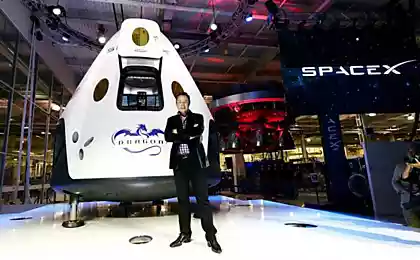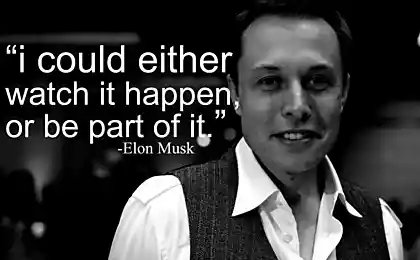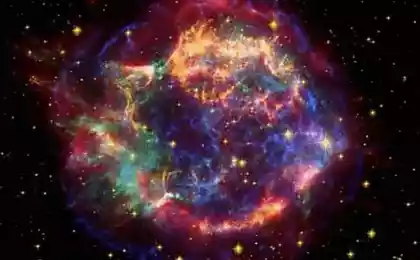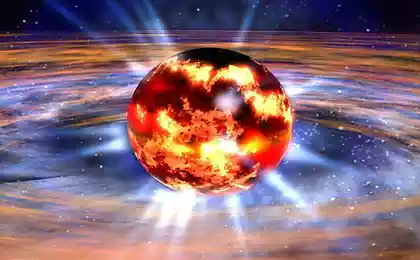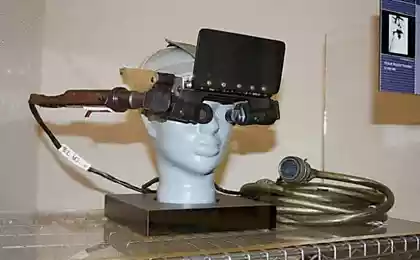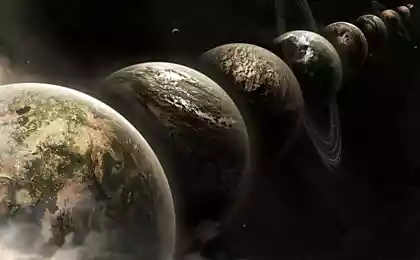768
World-simulation: do we really live in a virtual universe?
You probably have heard it: our world may be a sophisticated computer simulation that creates the feeling that we live in the real universe. Recently picked up this theme Elon Musk. And, he's right. But in this discussion about our real world or fictional, almost sounds another important argument: it does not matter.
But first, let's look at why the world may be a simulation. Similar ideas have advanced the ancient Greeks were what we may call a computer simulation, they believed, for example, dreams. And the first thing you need to understand that our perception of reality is reality itself. Reality is just electrical signals interpreted by our brain. We perceive the world not directly and not in the most perfect way. If we could see the world as it is, there would be no optical illusions, no blindness, nor different kinds of tricks that allow you to enter the brain in error.
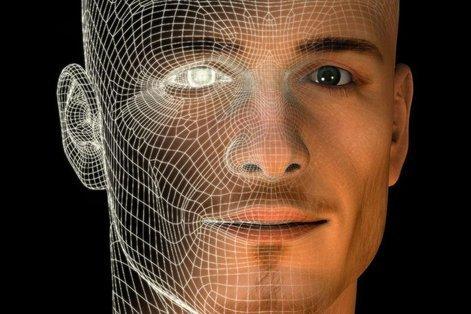
Moreover, we perceive only a simplified version of this sensory information. To see the world as it is, requires too much computing power, so that our brain simplifies it. He is constantly looking for patterns in the world and relates them to our perception. Therefore, what we call reality, is just an attempt of the brain to process incoming data from the senses.
And if our perception depends on this simplified flow of information, no matter what its source — the physical world or a computer simulation that throws us the same information. But is it possible to create such a powerful simulation? Let's look at the universe from the point of view of physicists.
The fundamental laws
From a physical point of view, in the world are based on four fundamental interactions:
They control the behavior of all particles in the known universe. To calculate the effect of these forces and simulate the simplest interaction is pretty easy, and to some extent we are already doing. But the more interacting with each other particles is added to the picture, the harder it is to model. However, it is a question of computing power.
Now we don't have enough computing power to simulate the entire universe. Physics can even say that such modeling is impossible — not because it's too difficult, but because the computer simulating the universe, will be greater than this whole universe. And this is obviously an impossible task. However, this logic has a flaw: to simulate the entire universe and create the feeling that you live in a certain universe is not the same thing.
A computer problem would not be solved if our brain could not so easily deceived. For example, watching a movie or video on the Internet, which is transmitted with a delay and fragmented, but we see this as a single serial stream. The logic is simple: you need to reduce the detail to a level at which an optimal compromise between quality and complexity and where the brain ceases to distinguish.
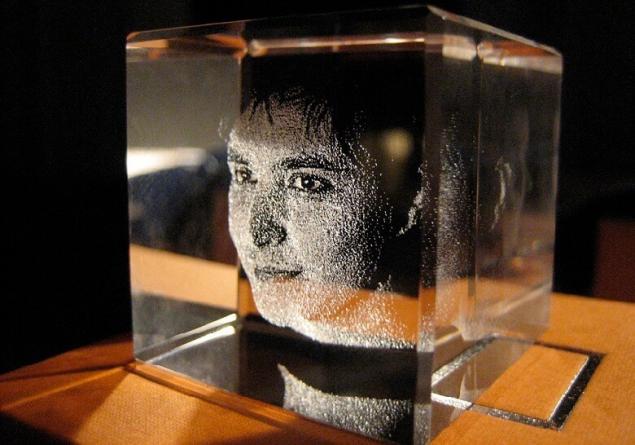
There are lots of techniques that reduce the need for computing capabilities in a simulated universe. The most obvious: do not process or show something that no one is watching. Another technique is to portray, as if the universe is vast and infinite, although in reality it is not. This technique is used in many video games: reducing the detail in the depiction of distant objects, we save a lot of effort and generated objects only when the player detects them really. For example, in the game No Man's Sky, a huge virtual universe is generated on the fly as the player explores it.
Finally, it is possible to introduce fundamental physical principles, which is extremely difficult or impossible to reach any other planet, and therefore, those who are experiencing the simulation, trapped in his own world (the speed of light, the ever-expanding universe — yeah, yeah).
If we combine these approaches with some mathematical techniques (e.g., fractal geometry), you can create a fairly decent simulation of the universe, which relies on heuristic principles of our brain. This universe seems infinite, but it's just a trick.
However, this in itself does not prove that — as they say Musk and other proponents of this idea, we with a high probability of living in a virtual world.
What is the argument?

Simulation and mathematics
The argument about the simulation worked the Oxford philosopher Nick Bostrom. It relies on a few assumptions which are — at a certain interpretation, lead to the conclusion that our universe is likely a simulation. It's pretty simple:
1. The universe it is possible to simulate (see above).
2. Every civilization or dying (pessimistic view) before gains the ability to simulate the universe, or loses interest in the simulation, or continues to develop reaches technological level to create such simulations. It is only a matter of time. (If we do the same? And, of course...)
3. Reaching this level, civilization creates many different simulations. (Everyone wants to have their own universe.)
4. When the simulation reaches a certain level, she begins to create his own simulation (and so on).
If you perform all of this automatically, you have to conclude that the probability of dwelling in the real world is extremely small — too many potential simulations. From this point of view, more likely that our world — simulation level 20, not the original universe.
The first time I heard this argument, I'm a little scared. But here's the good news: it doesn't matter.
"Reality" is just a word
We have already discussed that our perception of reality differs from reality itself. Suppose for a moment that our universe really a computer simulation. This gives rise to the following logical chain:
1. If the universe is only a model, it is a combination of bits and bytes, to put it simply, information.
2. If the universe is information, and you — information I — information.
3. If we all — the information, our body is just an embodiment of that information, a kind of avatars. The information is not tied to a specific object. It can copy, convert, change as you'd like (only need corresponding programming techniques).
4. Any society that can create the simulation world, it is also able to give your "personal" information a new avatar (since it requires less knowledge than the simulation of the universe).
In other words, information that identifies you, is not attached to your body. Philosophers and theologians have been arguing about the duality of body and soul (mind, personality, etc.). So this concept is probably familiar to you.
Thus, reality is information, and we — information. Simulation — part of the reality which it simulates, and all that we are simulating, the same reality from the point of view of those we are simulating. So, reality is what we experience. There's a rather popular theory that States that every object that we see is a projection of information from the other end of the universe or even from another universe.
Also interesting: Daniel Holman: Attention is a muscle that must be trained
How the brain is affected by time of day
That is, if you have something you feel, perceive is "real". And a simulated universe is as real as the universe that manages the simulation, because reality is determined by the content of the information — and not to those where this information is stored.published
Author: Maxim Rubinchik
P. S. And remember, just changing your mind — together we change the world! ©
Source: ideanomics.ru/?p=6947
But first, let's look at why the world may be a simulation. Similar ideas have advanced the ancient Greeks were what we may call a computer simulation, they believed, for example, dreams. And the first thing you need to understand that our perception of reality is reality itself. Reality is just electrical signals interpreted by our brain. We perceive the world not directly and not in the most perfect way. If we could see the world as it is, there would be no optical illusions, no blindness, nor different kinds of tricks that allow you to enter the brain in error.

Moreover, we perceive only a simplified version of this sensory information. To see the world as it is, requires too much computing power, so that our brain simplifies it. He is constantly looking for patterns in the world and relates them to our perception. Therefore, what we call reality, is just an attempt of the brain to process incoming data from the senses.
And if our perception depends on this simplified flow of information, no matter what its source — the physical world or a computer simulation that throws us the same information. But is it possible to create such a powerful simulation? Let's look at the universe from the point of view of physicists.
The fundamental laws
From a physical point of view, in the world are based on four fundamental interactions:
- strong
- weak
- electromagnetic,
- gravity.
They control the behavior of all particles in the known universe. To calculate the effect of these forces and simulate the simplest interaction is pretty easy, and to some extent we are already doing. But the more interacting with each other particles is added to the picture, the harder it is to model. However, it is a question of computing power.
Now we don't have enough computing power to simulate the entire universe. Physics can even say that such modeling is impossible — not because it's too difficult, but because the computer simulating the universe, will be greater than this whole universe. And this is obviously an impossible task. However, this logic has a flaw: to simulate the entire universe and create the feeling that you live in a certain universe is not the same thing.
A computer problem would not be solved if our brain could not so easily deceived. For example, watching a movie or video on the Internet, which is transmitted with a delay and fragmented, but we see this as a single serial stream. The logic is simple: you need to reduce the detail to a level at which an optimal compromise between quality and complexity and where the brain ceases to distinguish.

There are lots of techniques that reduce the need for computing capabilities in a simulated universe. The most obvious: do not process or show something that no one is watching. Another technique is to portray, as if the universe is vast and infinite, although in reality it is not. This technique is used in many video games: reducing the detail in the depiction of distant objects, we save a lot of effort and generated objects only when the player detects them really. For example, in the game No Man's Sky, a huge virtual universe is generated on the fly as the player explores it.
Finally, it is possible to introduce fundamental physical principles, which is extremely difficult or impossible to reach any other planet, and therefore, those who are experiencing the simulation, trapped in his own world (the speed of light, the ever-expanding universe — yeah, yeah).
If we combine these approaches with some mathematical techniques (e.g., fractal geometry), you can create a fairly decent simulation of the universe, which relies on heuristic principles of our brain. This universe seems infinite, but it's just a trick.
However, this in itself does not prove that — as they say Musk and other proponents of this idea, we with a high probability of living in a virtual world.
What is the argument?

Simulation and mathematics
The argument about the simulation worked the Oxford philosopher Nick Bostrom. It relies on a few assumptions which are — at a certain interpretation, lead to the conclusion that our universe is likely a simulation. It's pretty simple:
1. The universe it is possible to simulate (see above).
2. Every civilization or dying (pessimistic view) before gains the ability to simulate the universe, or loses interest in the simulation, or continues to develop reaches technological level to create such simulations. It is only a matter of time. (If we do the same? And, of course...)
3. Reaching this level, civilization creates many different simulations. (Everyone wants to have their own universe.)
4. When the simulation reaches a certain level, she begins to create his own simulation (and so on).
If you perform all of this automatically, you have to conclude that the probability of dwelling in the real world is extremely small — too many potential simulations. From this point of view, more likely that our world — simulation level 20, not the original universe.
The first time I heard this argument, I'm a little scared. But here's the good news: it doesn't matter.
"Reality" is just a word
We have already discussed that our perception of reality differs from reality itself. Suppose for a moment that our universe really a computer simulation. This gives rise to the following logical chain:
1. If the universe is only a model, it is a combination of bits and bytes, to put it simply, information.
2. If the universe is information, and you — information I — information.
3. If we all — the information, our body is just an embodiment of that information, a kind of avatars. The information is not tied to a specific object. It can copy, convert, change as you'd like (only need corresponding programming techniques).
4. Any society that can create the simulation world, it is also able to give your "personal" information a new avatar (since it requires less knowledge than the simulation of the universe).
In other words, information that identifies you, is not attached to your body. Philosophers and theologians have been arguing about the duality of body and soul (mind, personality, etc.). So this concept is probably familiar to you.
Thus, reality is information, and we — information. Simulation — part of the reality which it simulates, and all that we are simulating, the same reality from the point of view of those we are simulating. So, reality is what we experience. There's a rather popular theory that States that every object that we see is a projection of information from the other end of the universe or even from another universe.
Also interesting: Daniel Holman: Attention is a muscle that must be trained
How the brain is affected by time of day
That is, if you have something you feel, perceive is "real". And a simulated universe is as real as the universe that manages the simulation, because reality is determined by the content of the information — and not to those where this information is stored.published
Author: Maxim Rubinchik
P. S. And remember, just changing your mind — together we change the world! ©
Source: ideanomics.ru/?p=6947



